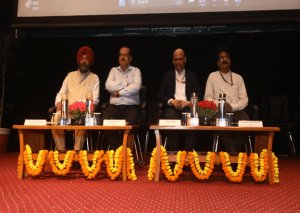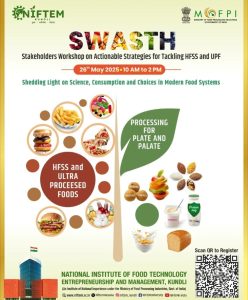Ministry of Food Processing Industries (MoFPI), in collaboration with the National Institute of Food Technology Entrepreneurship and Management (NIFTEM-Kundli), organized a one-day SWASTH workshop (Stakeholders Workshop on Actionable Strategies for Tackling HFSS and UPF). The workshop focused on “Shedding Light on Science, Consumption, and Choices in Modern Food.”
Keynote speakers at the Swasth Workshop
Delivering the keynote address, at the SWASTH workshop Dr. Subrata Gupta, Secretary, MoFPI, emphasized that in today’s fast-paced world, health and diet have become more important than ever. He noted a growing public consciousness around wellness, as evident from the increasing use of smart-watches to track daily physical activity. However, he pointed out a critical oversight: “While we keep track of how many steps we walk each day, we often fail to monitor how much energy or how many calories we consume every day.”
To address this gap, Dr. Gupta encouraged NIFTEM-K to lead the development of a smart watch-like device capable of measuring an individual’s daily calorie or energy intake. Referring to global health trends, he cited WHO and MCI data, which indicate that two-thirds of global deaths are caused by non-communicable diseases (NCDs). He also highlighted pressing concerns such as food adulteration in processed products and large-scale food wastage, and called for collective innovation and action to tackle these issues. Dr. Gupta also asked NIFTEM-K to organise these kind of events on regular basis.
Dr. Harinder Singh Oberoi, Director, NIFTEM-K in his welcome note at the swasth workshop, announced that the institute will soon propose the inclusion of chapters on food processing in NCERT textbooks. The initiative aims to educate children about healthy eating habits from a young age. Referencing traditional Indian wisdom, Dr. Oberoi remarked: “Food be the medicine,” echoing time-tested remedies passed down by grandmothers. He added that NIFTEM-K, in collaboration with FSSAI is willing to work actively to standardize and notify methodologies for determining added sugar in food products—bridging the gap between traditional knowledge and modern science.
Dr. Ravinarayan Acharya, DG, Central Council for Research in Ayurvedic Sciences (CCRAS), spoke on the traditional principles of Ayurveda during the swath workshop. Highlighting the ancient concept of “Hitam-Ahitam, Sukham-Dukham”, he noted that in Ayurveda, food itself is considered medicine. “The primary objective of Ayurveda is to maintain good health, while treating illness comes second,” he explained. Dr. Acharya also stated that the Ministry of Ayush is working closely with FSSAI, various central ministries, and state governments to ensure the safety, quality, and healthfulness of food products.
 Dr. Satyen Panda, Executive Director (R&D) and Advisor (QA, FSSAI), addressed the risks associated with HFSS (High in Fat, Salt, and Sugar) and ultra-processed foods (UPFs). He noted that adulteration is widespread in many processed items and emphasized the need for a balanced and scientific approach to combat this growing concern effectively.
Dr. Satyen Panda, Executive Director (R&D) and Advisor (QA, FSSAI), addressed the risks associated with HFSS (High in Fat, Salt, and Sugar) and ultra-processed foods (UPFs). He noted that adulteration is widespread in many processed items and emphasized the need for a balanced and scientific approach to combat this growing concern effectively.
In the first technical session at the swasth workshop Dr. Priyanka Bansal, Sceintist-E, ICMR highlighted about the different guidelines issued by ICMR from time to time and also about different schemes of ICMR for anaemia, addressing nutrient deficiency etc. Mr. Ashim Sanyal, CEO of Consumer VOICE, emphasized the urgent need to define HFSS in the Indian context and advocated for the accelerated adoption of scientifically validated Nutrient Profiling Models (NPMs) tailored to national dietary and public health needs and earliest implementation of FoPNL.
Also Read : 3 Risky Realities of Sugar-Free & No Added Sugar Foods
The second session, of the swasth workshop titled “Science Beyond HFSS and UPF: Presentation of FAQs”, was led by experts from academia and research.
Dr. Komal Chauhan, Dean (Research), NIFTEM-K, highlighted that the blanket assumption that all processed foods are harmful is incorrect and called for nuanced, evidence-based discussions.
Dr. Heena Yadav, Asst. Prof., NIFTEM-K presented a comprehensive FAQ document on HFSS and UPF, elaborating on the NOVA classification system and outlined the next steps, including wider consultations and submission of the report to the MoFPI. Adding to the academic perspectives,


Dr. Swati Bhardwaj from a Public Health Organization “Resolve to Save Lives” further stressed the need to establish standardized portion sizes across food categories to better guide consumers and policymakers alike.
The third session of swasth workshop focused on the food industry’s perspective, bringing together experts from regulatory, legal, and allied sectors. Leading companies such as ITC Ltd., Marico, Nestlé India Ltd., and Jadli Foods India P Ltd, along with industry associations like FICCI, CII, PBFIA, India Honey Alliance, and IFBA shared their views and concerns regarding HFSS foods and UPF.
There was broad consensus on the need for robust clinical trials and strong scientific evidence before formulating or implementing HFSS and UPF-related policies that could significantly impact both public health and the food industry.
During the discussion at the swasth workshop industry representatives urged policymakers to consider a serve size-based regulatory model and called for a comprehensive national nutrition survey to better understand actual dietary habits and the health needs of India’s diverse population.
Associations also emphasized the importance of moving beyond emotional rhetoric to focus on the scientific and economic contributions of the Indian food processing sector. “Food processing is often unfairly criticized in public debates, while its positive contributions—such as ensuring food safety, maintaining hygiene standards, reducing food wastage, and creating employment—are frequently overlooked,” noted the participant. It was strongly advocated that future policies be grounded in rational, evidence-based frameworks that reflect the complex realities of modern food systems.
Participants also highlighted a key concern that many genuinely healthy foods, such as coconut milk, oat milk, and tofu, may fall under the UPF category despite their nutritional value, underscoring the need for greater nuance and clarity in classification systems. With the participation of over 80 in-person attendees from industry, academia, regulatory bodies, business associations, consumer forums, and start-ups, the event also saw more than 100 virtual participants joining online.
The swasth workshop event concluded with a call for balanced awareness – encouraging consumers to be informed about HFSS and UPF, without succumbing to fear or confusion. The takeaway message: “Eat consciously. Keep it simple. Avoid ‘Virrudha Aahar’ (incompatible food combinations), so that NCDs can be prevented.”

